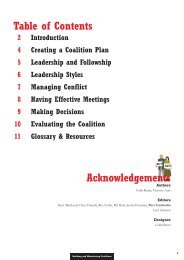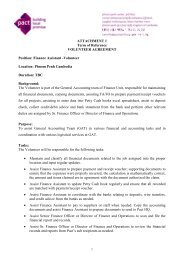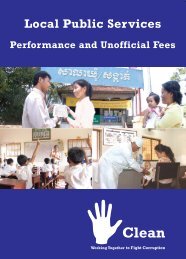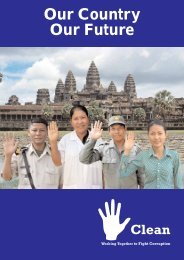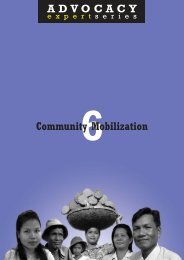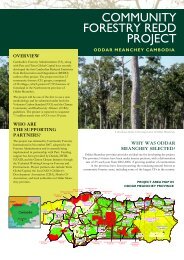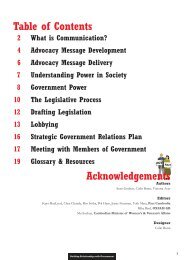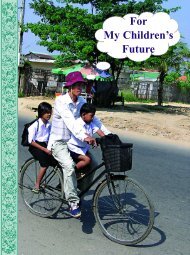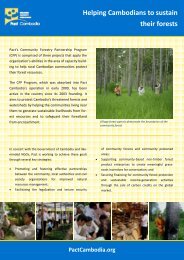Advocacy in Cambodia: Increasing Democratic ... - Pact Cambodia
Advocacy in Cambodia: Increasing Democratic ... - Pact Cambodia
Advocacy in Cambodia: Increasing Democratic ... - Pact Cambodia
Create successful ePaper yourself
Turn your PDF publications into a flip-book with our unique Google optimized e-Paper software.
Increas<strong>in</strong>g <strong>Democratic</strong> Space<br />
Election Law, and women’s issues. Although the<br />
lack of policies relat<strong>in</strong>g to some of these issues<br />
directly affects a large portion of <strong>Cambodia</strong>ns,<br />
many <strong>Cambodia</strong>ns are still at the subsistence level<br />
and are primarily concerned about issues that<br />
directly affect their livelihoods. As the education<br />
and economic level of <strong>Cambodia</strong>ns <strong>in</strong>crease, there<br />
is the hope that local communities will beg<strong>in</strong> to<br />
address some advocacy issues that fall outside of<br />
livelihood concerns.<br />
Assess<strong>in</strong>g Relevance of <strong>Advocacy</strong> Agendas<br />
Some advocacy issues <strong>in</strong> the case studies<br />
relate to empowerment of vulnerable groups and<br />
the protection of their rights: women’s rights,<br />
children’s rights, the rights of people liv<strong>in</strong>g with<br />
AIDS, etc. It is <strong>in</strong>terest<strong>in</strong>g to note that the problem<br />
of advocacy concern<strong>in</strong>g economic assets was not<br />
addressed by NGOs until the problem had become<br />
widespread. There are a number of other<br />
economic problems that are not be<strong>in</strong>g addressed<br />
by associations or other non-profit organizations<br />
such as m<strong>in</strong>eral rights, market monopolies, and<br />
fees levied on taxis.<br />
Some voices with<strong>in</strong> the development<br />
community question whether NGOs take the time<br />
to identify issues that are the most relevant to their<br />
communities. There have been cases, for example<br />
with<strong>in</strong> the urban sector, <strong>in</strong><br />
which NGOs <strong>in</strong> one<br />
community are not aware<br />
of a significant problem or<br />
self-organized community<br />
advocacy effort <strong>in</strong> an<br />
adjacent community.<br />
Some problems that NGOs<br />
believe are isolated to the<br />
areas <strong>in</strong> which they work<br />
could be more widespread<br />
on a national level, as was<br />
discovered with the<br />
fisheries issue.<br />
There are various<br />
explanations for why<br />
NGOs fail to see relevant<br />
issues. NGOs have limited<br />
resources and staff is usually over-extended. Once<br />
a target area or a program activity has been<br />
established, the NGO may not have the flexibility<br />
to discover if an issue of similar importance is<br />
happen<strong>in</strong>g <strong>in</strong> a neighbor<strong>in</strong>g area. Some NGOs may<br />
not have the capacity or resources to be<br />
cont<strong>in</strong>uously identify<strong>in</strong>g critical issues.<br />
Disputes related to assets tend to be local<br />
issues and NGOs may not be tapped <strong>in</strong>to local<br />
agendas as quickly as they should be. Some NGOs<br />
feel hesitant to address high-conflict disputes that<br />
<strong>in</strong>volve powerful figures. Some perceive their<br />
There is a general consensus that<br />
donors <strong>in</strong> <strong>Cambodia</strong> are curtail<strong>in</strong>g<br />
support for community<br />
development activities and shift<strong>in</strong>g<br />
their focus to the areas of advocacy<br />
and governance. As donor <strong>in</strong>terest<br />
<strong>in</strong> advocacy <strong>in</strong>creases, NGOs will<br />
seek to add advocacy to their<br />
overall agenda.<br />
target communities as beneficiaries of aid<br />
assistance rather than constituents. F<strong>in</strong>ally, they<br />
may not perceive their mandate as <strong>in</strong>clud<strong>in</strong>g<br />
<strong>in</strong>terest groups made up of professional<br />
associations, such as market vendors. Regardless<br />
of the reason, NGOs will have to go beyond us<strong>in</strong>g<br />
the traditional PRA tool and use other needs<br />
identification tools if they expect to cont<strong>in</strong>ue to<br />
be responsive to their communities.<br />
A role for NGOs <strong>in</strong> an advocacy campaign is<br />
as facilitators who l<strong>in</strong>k local level issues to policy<br />
changes. Villagers and affected communities are<br />
a fundamental resource for NGOs <strong>in</strong> identify<strong>in</strong>g<br />
current and future issues. Although outsiders can<br />
play a strong catalyst role <strong>in</strong> a campaign, it is<br />
important for NGOs to see the communities they<br />
work with as agents of change that have the ability<br />
to formulate advocacy agendas.<br />
Donor Agendas<br />
There is a general consensus that donors <strong>in</strong><br />
<strong>Cambodia</strong> are curtail<strong>in</strong>g support for community<br />
development activities and shift<strong>in</strong>g their focus to<br />
the areas of advocacy and governance. As donor<br />
<strong>in</strong>terest <strong>in</strong> advocacy <strong>in</strong>creases, NGOs will seek to<br />
add advocacy to their overall agenda. Support<br />
agencies need to be thoughtful when <strong>in</strong>itiat<strong>in</strong>g<br />
support for advocacy activities. Partners need<br />
adequate organizational capacity and a sound<br />
program base prior to<br />
<strong>in</strong>itiat<strong>in</strong>g advocacy<br />
campaign support.<br />
Successful advocacy<br />
requires familiarity with<br />
the technical aspects of a<br />
problem, for example legal<br />
assistance <strong>in</strong> the case of<br />
draft legislation. <strong>Advocacy</strong><br />
should rema<strong>in</strong> closely<br />
l<strong>in</strong>ked to regular program<br />
activities and strongly<br />
aligned with the<br />
organization’s overall<br />
goals. There cont<strong>in</strong>ues to<br />
be a strong role for<br />
advocacy membership<br />
organizations and networks supported by donor<br />
agencies. F<strong>in</strong>ally, donors and support agencies<br />
should bear <strong>in</strong> m<strong>in</strong>d the long-term aspect of<br />
advocacy and determ<strong>in</strong>e the duration of their<br />
support before <strong>in</strong>itiat<strong>in</strong>g an advocacy program.<br />
Hopefully, advocacy is demand driven or at<br />
the very least responsive to problems considered<br />
important for a group of people. <strong>Advocacy</strong> that is<br />
propelled by multilateral banks or donors is likely<br />
to be much more challeng<strong>in</strong>g <strong>in</strong> regards to<br />
mobiliz<strong>in</strong>g communities. Some donors use<br />
fund<strong>in</strong>g conditionality to achieve their advocacy<br />
18





